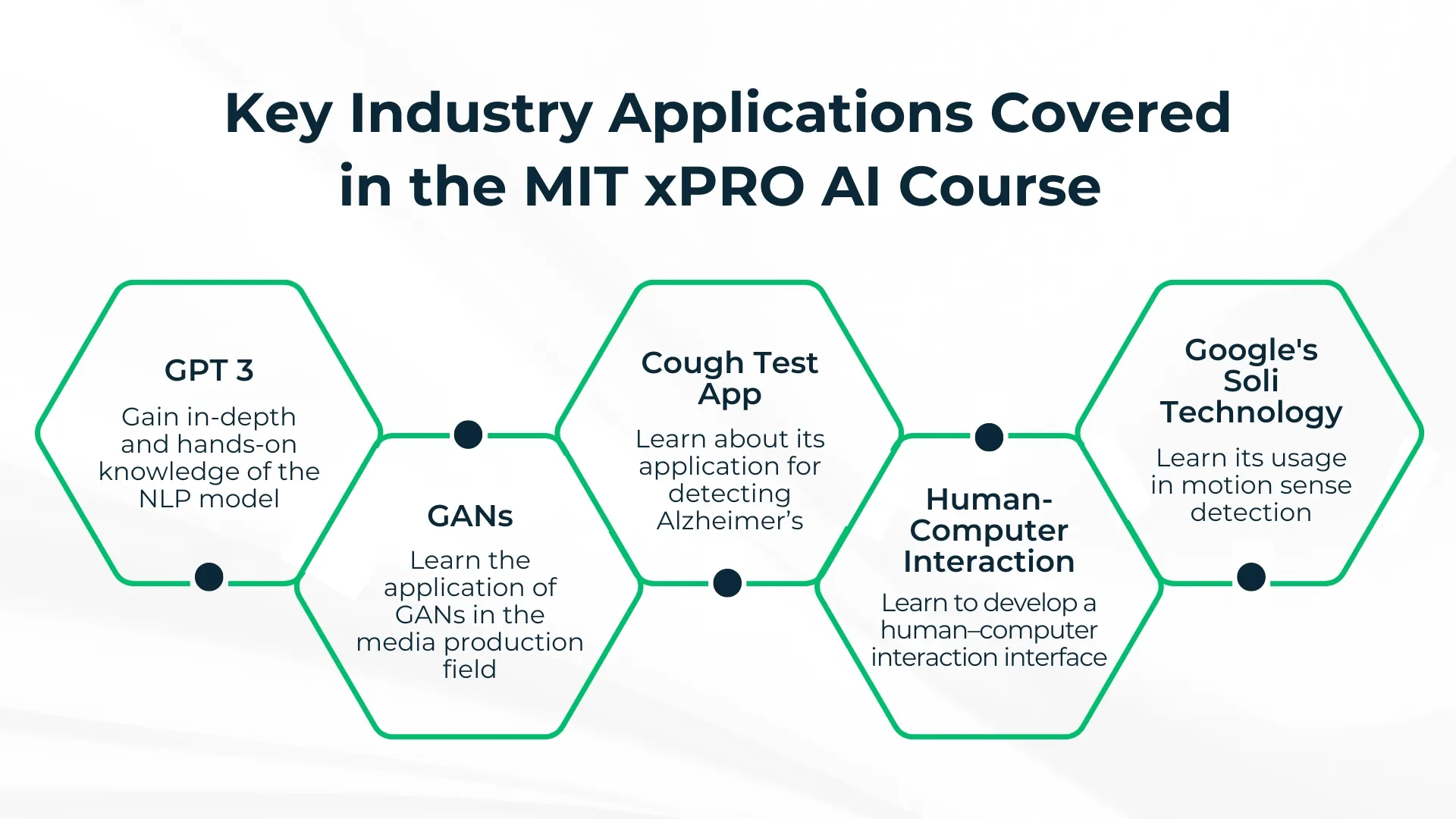Maximize Your Product Success From Concept to Launch With an AI Course

- An AI Course Steers Product Ideation to the Right Direction
- What to Consider at the Preparation Stage—an AI Course as Your Guide Map
- An AI Course as a Model Selection Stage Guide Map
- What to Consider at the Deployment Stage—AI Courses for Your Aid
- An AI Course in Focus—MIT xPRO Designing and Building AI Products and Services
| Synopsis: The success of AI implementation hinges on strategic thinking from the early stages of product ideation to deployment. Many technology professionals lack the strategic mindset to fully leverage AI’s potential. To bridge this gap, advanced AI courses, such as the MIT xPRO Designing and Building AI Products and Services course, equip product professionals with the skills to incorporate artificial intelligence (AI) and machine learning (ML) innovations into their work effectively. |
Implementing artificial intelligence and machine learning products can potentially turn around the product development process in ways that an organization may not even imagine. Cost reduction, process optimization, faster deployment, and efficiency are the benefits you witness when AI is just warming up to an organization’s ecosystem. Yet, AI often fails to deliver to technology professionals who do not think like strategists from the product ideation stage to the deployment stage. This is a gap that a modern AI course, such as the MIT xPRO Designing and Building AI Products and Services course, helps to fill.
Advanced artificial intelligence programs help product professionals incorporate AI and ML innovations to rake in sustainable business benefits.
An AI Course Steers Product Ideation to the Right Direction
The unpredictability of outcomes from AI-based products can be due to its mismatch with the organization’s overarching goal. Such a probability makes it imperative for stakeholders to collaborate and ideate the best way forward.
Considerations at the ideation stage of a product include:
- Identifying high-impact and rapid wins for AI initiatives and subsequently scaling them
- Ensuring collaboration among data scientists, IT teams, software developers, and business professionals
- Getting buy-in from C-suite executives by suggesting the tangible benefits of AI products in business
How Can an AI Course Help Build a Strong Case for Your Initiative?
Tech professionals and even AI start-up founders are capitalizing on AI certificate programs such as the MIT xPRO Designing and Building AI Products and Services course to strengthen the foundation of their projects. This program helps participants to:
- Acquire practical skills to critically assess the four key stages of the AI design process. Understand the significance, challenges, and best practices of the four key stages for successful implementation
- Analyze the interaction between humans and computers in AI systems, focusing on how human input, oversight, and collaboration enhance AI performance and decision-making
- Prepare an executive summary of a product development road map, using the AI design process model
What to Consider at the Preparation Stage—an AI Course as Your Guide Map
Products deployed on a large-scale basis must be prepared with the most cutting-edge algorithms, requiring diverse datasets to be trained on relationships, patterns, and behaviors. However, the nontransparent aspect of AI models makes their success hinge largely on the quantity and quality of data used during their preparation stages. To ensure sound input data quality, some considerations of technical product managers include:
- Creating a data estate to house all the critical indexed and labeled data, enabling seamless accessibility control
- Leveraging this data to map departmental workflows and using AI models to boost operational efficiency across the process flows
- Leveraging the data estate as a single source of truth to ascertain an AI product’s risk and legal liabilities while following the AI3S model (scan, shield, and steer)
- Using application programming interfaces (APIs) as an alternative to a data estate to exchange data points
How Does an AI Course Aid Tech Professionals in the Preparation Stage?
AI programs equip technology professionals with the essential skills and knowledge to ensure data quality throughout the product development process. Some of the best artificial intelligence courses, such as the MIT xPRO Designing and Building AI Products and Services program, emphasize the expertise required to create a framework for clean and unbiased data to steer a successful product project.
Professionals learn to validate data for completeness and accuracy and identify skewness, outliers, and other potential issues. AI courses introduce the concept of algorithms that help detect unusual or erroneous patterns in data. The extensive curriculum of this program covers techniques to fill in missing data values using statistical methods or machine learning models.
An AI Course as a Model Selection Stage Guide Map
Here are some key factors professionals must consider to identify the most appropriate AI model, which can also scale as per the product development scheme.
- Identify your organization’s key performance indicators, such as customer centricity and content access.
- Integrate machine learning operations (MLOps) to improve the speed at which AI and ML models can ingest data and adapt to swift business changes, delivering scalability.
- Ensure the provision of optimal hardware infrastructure to support AI and ML models that require heavy-duty computational resources.
- Prioritize model interpretability, especially in high-stakes industries such as health care and finance.
How an AI Course Can Be the Pathfinder at This Stage
Here is how an artificial intelligence product development program from MIT xPRO can help:
- Gain knowledge about various neural networks, including deep neural networks, convolutional neural networks, and recurrent neural networks. Get operational-level expertise about their structures, functionalities, and use cases.
- Explore unsupervised and semi supervised machine learning techniques, and analyze the outcomes of implementing them in diverse operational settings. Delve into applying AI to identify genetic disease risk factors.
- Develop a deep understanding of superminds, collaborative entities comprising humans and machines, and how various supermind configurations can effectively address diverse challenges.
What to Consider at the Deployment Stage—AI Courses for Your Aid
The most crucial part of the AI project life cycle is its deployment. Deployment also happens to be the most challenging part, as it entails a major cultural and operational change across an organization, which a section of the workforce may not warm up to. Such friction may defeat the project’s purpose, no matter how promising, as in the case of Package Flow Technology by UPS.
Staff engaged in the legacy process of UPS’s package assignment could not align with the delivery prediction model function. This failure was primarily due to the lack of insight into the technology. The incident reinstated the importance of integrating change management before deploying an AI model into an organization. Here are some key factors to consider for a successful implementation of AI and ML projects:
- Strategize communication for a collaborative dialogue between decision-makers and those who will be impacted by and tasked with executing the AI project.
- Implement version control to track and manage the evolution of your machine learning models, ensuring the correct version is deployed in production.
- Set up a development environment to test and validate models in a staging environment.
- Implement a multiregion deployment framework while balancing expense, latency, and data governance.
- Establish a disaster recovery plan aligned with the AI project framework for the prompt deployment of models in the event of a region-wide outage.
How Can an AI Course Steer Successful Deployment?
Here is how the MIT xPRO Designing and Building AI Products and Services course empowers the successful deployment of an AI project across an organization of any size and type:
- Master the “train, validate, test” method to avoid any possibilities of pitfalls while training the AI models post their deployment.
- Analyze your product design scheme from the perspective of a specific industry to understand the limitations and technical approaches to address prior to the deployment.
- Understand the optimal human-machine interaction ratio in AI systems to deploy the right amount of manual intervention required for seamless product performance.
- Adapt your product development to enable feature expansion without redesigns. For example, add voice cloning and avatars to your communication app without changing its layout.
An AI Course in Focus—MIT xPRO Designing and Building AI Products and Services
The MIT xPRO Designing and Building AI Products and Services course program aids AI enthusiasts, technology professionals such as product managers, start-up founders, and UI/UX designers, among others, in aligning their technical acumen with a strategic outlook to deploy this disruptive technology from inception to deployment.
During the program, learners will gain a deep understanding of various stages of an AI product life cycle and expertise in the industry application of advanced ML algorithms. This will help professionals hone their expertise and develop a strategic mindset.
Key Features of the MIT xPRO AI Product Development Program
MIT xPRO Designing and Building AI Products and Services course online course delivers the right mix of strategic and practical insights for technology enthusiasts with a keen interest in AI and generative AI (GenAI). The eight-week course blends bite-sized information and insights from industry leaders, preparing professionals to ideate and develop an AI project within the minimum turnaround time.
Some of the key aspects of the program include:
- A verified certificate and five continuing education units (CEUs) from the school
- The hands-on experience of presenting an AI project proposal to woo stakeholders
- Weekly bonus lessons on AI technology fundamentals, such as Bayesian classifiers, CNNs, and RNNs
- Practical experience of AI innovations in various fields, such as Dr. Regina Barzilay’s work on using AI to detect breast cancer
- Market-ready expertise to draw a product development blueprint with AI
- A capstone project in which learners design an AI application of their choosing
- Weekly live sessions with learning facilitators

While mastering new AI technologies is essential, effectively integrating them into your organization’s operations presents unique challenges. Professionals and aspiring leaders must consider multiple technical and strategic aspects to create all-around successful and sustainable AI product development strategies. The MIT xPRO AI program is designed to equip people with a perspective that aids in looking beyond the apparent functionalities or outcomes of AI technologies. These types of courses help product professionals become not only experts but visionaries who leverage the latest strategies to add more value than what was perceived by their organizations.














